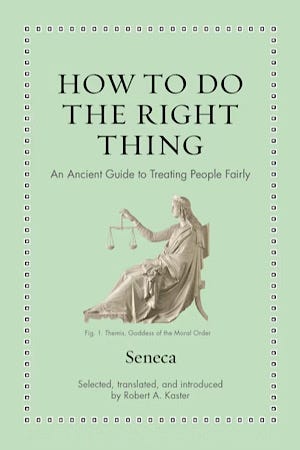How to do the right thing with Seneca
Part XXVII of the Ancient Wisdom for Modern Readers series
[Based on How to Do the Right Thing: An Ancient Guide to Treating People Fairly, by Seneca, translated by Robert Kaster. Full book series here.]
A sense of fairness is fundamental to human nature. From childhood onward, we instinctively cry out ‘That’s not fair!’ when confronted with perceived injustice. Modern primatologists like Frans de Waal have shown that this sense of fairness extends beyond humans to all social primates. What distinguishes humans is our ability to analyze unfairness and propose remedies.
In How to Do the Right Thing, part of Princeton Press’s Ancient Wisdom for Modern Readers series, Robert Kaster synthesizes Seneca’s writings on fairness and justice. Kaster draws primarily from three of Seneca’s works—On Benefits, On Mercy, and On Anger—while incorporating insights from On Tranquillity of Mind, On the Happy Life, On the Consistency of the Wise Person, and the Moral Epistles. The result is both a comprehensive survey of Seneca’s thought and an accessible introduction to Stoic philosophy.
Rather than following Seneca’s original texts, Kaster organizes his analysis around five aspects of fairness: (i) Striving for magnanimity; (ii) Being calm and thinking clearly; (iii) Judging oneself fairly; (iv) Doing right by others; (v) Being merciful. While this organization departs from Seneca’s original presentation, it effectively distills the Stoic components of fairness for modern readers.
Kaster establishes a fundamental Stoic principle in his introduction: “You cannot be fair and do right by others unless you sort yourself out first, and for a Stoic sorting yourself out begins and ends with your mind. The wise are not born but made.” Progress toward wisdom comes through cultivating magnanimity—literally ‘large mindedness’ (magnus animus in Latin). Magnanimity is a virtue, and for Seneca and the Stoics all virtues are unified, multiple aspects of the same fundamental thing, wisdom. Broadly speaking, virtue is the action of a rational mind in the act of making true judgments and arriving at right choices, given specific circumstances.
With that context in mind, let’s take a closer look at the text by way of a few highlights, accompanied by brief commentaries:
(i) Striving for magnanimity
Magnanimity—defined as a loftiness of spirit that enables calm endurance, disdains pettiness, and exhibits noble generosity—lies at the heart of Seneca’s analysis of fairness. This combination of qualities forms the foundation for treating others fairly.
“Even fortune’s gifts are pleasing when reason has blended and balanced them: it is reason that makes them agreeable, while the greedy get no satisfaction from them. Attalus used to use this metaphor: Have you ever seen a dog, jaws open wide, trying to snatch a bit of bread or meat its master has tossed? Whatever it gets, it immediately swallows whole and is always gaping hopefully for more. We’re the same way: whatever fortune tosses us as we wait we immediately swallow down without savoring, frantically intent on snatching more.” (Letter 72.8)
Drawing from his mentor Attalus, a respected Stoic philosopher, Seneca identifies insatiable greed as a root cause of unfairness and injustice. Like dogs snapping at scraps, we constantly hunger for whatever fortune offers.
Keep reading with a 7-day free trial
Subscribe to The Philosophy Garden: Stoicism and Beyond to keep reading this post and get 7 days of free access to the full post archives.




